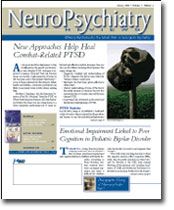NeuroPsychiatry Reviews: Healing Methods for PTSD
 NeuroPsychiatry Reviews, a magazine which reports on "new research and emerging trends in neuropsychiatry and neuroscience, with an emphasis on practical approaches to diagnosis and treatment" ran a cover story in January on new approaches to healing combat-related PTSD. Well worth a look...
NeuroPsychiatry Reviews, a magazine which reports on "new research and emerging trends in neuropsychiatry and neuroscience, with an emphasis on practical approaches to diagnosis and treatment" ran a cover story in January on new approaches to healing combat-related PTSD. Well worth a look...
Click on 'Article Link' below tags for more...
From NeuroPsychiatry Reviews:As troops return from deployments to Iraq or Afghanistan, the need for posttraumatic stress disorder (PTSD) treatment is expected to increase. National Guard and Reserve troops account for a high proportion of troops in the war zones, and as they return to their homes—some of them relatively far from Veterans Affairs health care facilities—community psychiatrists are likely to encounter more combat veterans seeking help.
Matthew J. Friedman, MD, PhD, Executive Director of the VA’s National Center for PTSD in White River Junction, Vermont, told NeuroPsychiatry Reviews that these vets are coming home to a more supportive environment and to more informed and effective medical treatment than was the case for soldiers returning from Vietnam. The major changes are:
"We now have tested, validated treatment options for PTSD that have been shown to be effective by high standards of evidence-based medicine," Dr. Friedman said. "Two SSRIs are approved for treatment of PTSD. There is also definitive evidence for the effectiveness of cognitive behavioral therapy [CBT], including prolonged exposure therapy and cognitive processing therapy. Eye movement desensitization and reprocessing is somewhat controversial but also supported by clinical trial data.
"One major problem is that CBT is the most effective treatment for PTSD but is also the modality having the fewest trained personnel nationwide," Dr. Friedman added. "Consequently, clinicians not trained in CBT should turn to SSRIs as firstline treatment."
Sertraline and paroxetine are approved by the FDA for treatment of PTSD, he continued. Patients showing a partial response are sometimes treated with other medications that may be tailored to the specific residual symptoms. These might include antiadrenergic medications for arousal, insomnia, and reexperiencing symptoms; venlafaxine for broad-spectrum symptomatic relief; anticonvulsants and mood-stabilizing drugs for mood swings, impulsivity, or violent behavior; trazodone for sleep problems; and atypical antipsychotics for patients whose symptoms are refractory to other agents. Benzodiazepines are not recommended because they have proven ineffective in randomized trials and due to the risk of drug dependence.
Dr. Friedman cautioned that even patients successfully treated with SSRIs are at risk of recurrence if treatment is discontinued. He recommended maintaining SSRIs for six to 12 months before attempting to discontinue them.
Another problem is that SSRIs and other antidepressants may—in rare instances—"produce activation side effects which may exacerbate PTSD-related arousal symptoms." Dr. Friedman recommended "starting low and going slow" with these drugs due to concern that they may increase physical restlessness and insomnia.
Most patients with PTSD who are likely to recover will do so within the first two years, by which time more than half will have recovered. Another 20% will recover over the next five years. About 50% of patients with PTSD will achieve complete remission with CBT alone and about 30% with SSRIs alone. "Obviously, we hope to do better with the new drugs under development, Dr. Friedman said. "The big unanswered questions are whether to combine treatments, which to combine, and how to identify the patient likely to need combination treatment."
As much as we'd like to have the 'magic pill' that takes care of all of our worries and does the hard work of recovery for us, it's just not going to be that easy. Although these medications are a useful tool, they are not the end all and be all for combat PTSD treatement.
Factors of nature (genetics) and nurture (environment) are briefly reviewed, with the article closing on the following important note:Finally, "the most important factor in whether an acute stress reaction will become chronic PTSD is social support, including support from the soldier’s combat unit, family, community, and wider society," Dr. Friedman said. "Because of the political polarization of the nation during Vietnam, some people took their displeasure out on the troops, young men and women who had risked their lives, when their real anger was directed at decisions made by the country’s leaders. Our nation has grown up, and I think we are now sophisticated enough not to confuse our feelings about the war with our feelings about the warrior."
Offering every single one of our returning veterans a broad and strong social support network is key to their recovery from the effects of combat. Not every soldier or Marine who returns home has such a network of support to fall back on. That's where we, average citizens, come in to play.
Our troops need us more than ever to support them in real and tangible ways. Some need our help more than others. Look around. How are your troops doing in your community? Don't know? Reach out then and ask if they need your help; find creative ways to lend a hand -- even if it's only a day or two a month; and consider supporting them both with your time and your money, if you have it within your means.
If you'd like to offer feedback on this article, email NeuroPsychiatry Reviews and thank them for their look at combat PTSD.


